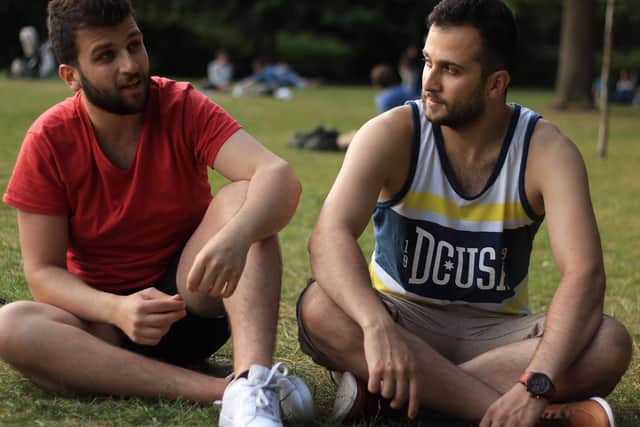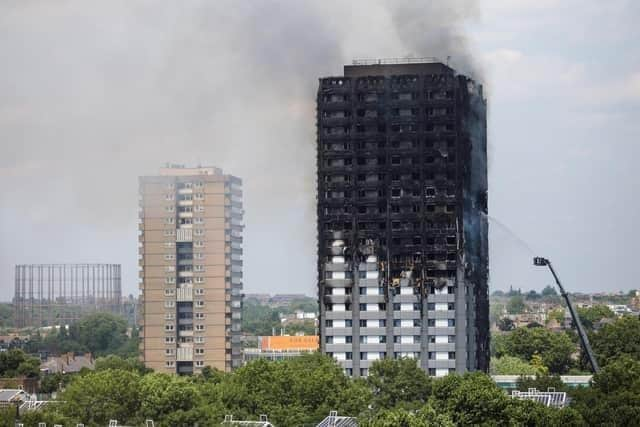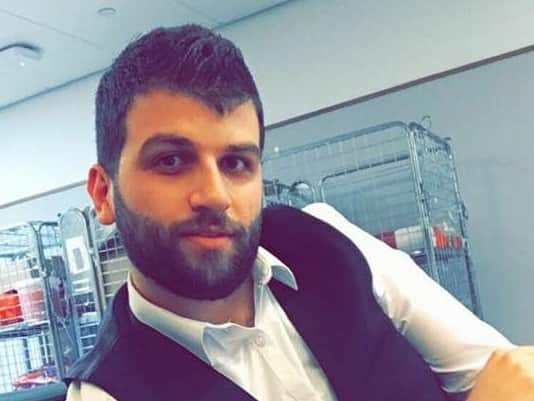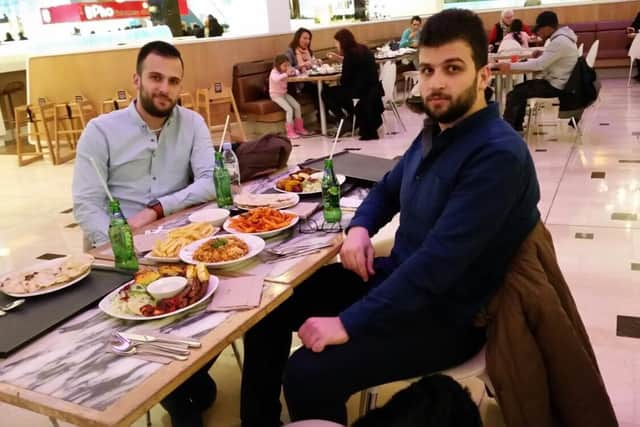Grenfell: ‘I didn’t lose my brother during the war in Syria, I lost him in London’ - survivor six years on
and live on Freeview channel 276
Omar and Mohammad Alhaj Ali came to the UK from Syria in 2014 in search of a better life.
Having fled the war, the pair happily settled in London, pursuing their studies while working.
Advertisement
Hide AdAdvertisement
Hide AdAfter spending time in a house share in Holland Park, the two brothers moved into a flat on the 14th floor of Grenfell Tower in September 2016, just nine months before the deadly fire.
On June 14 2017 it was Ramadan. The pair attended an iftar meal at a friend’s house before returning home.
“I remember I was half asleep. My brother was too and I started to hear some screaming outside, some noise, police cars, ambulances and at first I thought it was normal as in London you hear a lot of police and ambulance cars on the roads,” Omar told LondonWorld.
However, after peering out of the window to their shock and horror they could see that the building was on fire.
Advertisement
Hide AdAdvertisement
Hide Ad“We opened the door and we were hit by black thick smoke hitting our face. We couldn’t breathe,” the 31-year-old said. “We closed the door as we thought the fire was possibly in the corridor.”
Around an hour later two firefighters came to their door but told them to stay put. Half an hour later they returned with an older man, Denis Murphy, asking them to look after him. Omar said: “He inhaled a lot of smoke and he was struggling to breathe. We looked at him and we were so shocked and scared. We had to support him, give him water.”
Another 30 minutes passed and the firefighters returned again moving them into the flat next door, with other neighbours.
“There was a man with his wife (Oluwaseun Talabi and Rosemary Oyewole) and their baby, and as well another lady called Zainab (Deen) and her baby, and me and my brother and Denis,” he said.


“People were screaming everywhere around us”
Advertisement
Hide AdAdvertisement
Hide Ad“We were all scared, crying, praying, shouting from the windows. People were screaming everywhere around us, all I heard was noise around me. The noise of the police, the noise of the ambulance cars, firefighters, people screaming, children, kids. I can still hear it today,” said Omar.
“My brother was reading the Quran and I was just running around the flat as I felt like we’re going to die here.
“One of the neighbours tried to escape from the window using some sheets tied together. He was trying to save his daughter. He made an attempt, with his daughter on his back, but he discovered the sheets weren’t strong enough. My brother and I pulled him back.”
The door opened and a firefighter grabbed Omar. He found himself out on the hallway unable to breathe or see anything.
Advertisement
Hide AdAdvertisement
Hide Ad“I tried to shout to my brother but I couldn’t. I tried to look around. I couldn’t see him,” he said.
“I started to move slowly, and I felt like I’m going to faint: I’m going to die on the way, that’s it I can’t breathe anymore. I’m inhaling all this smoke and and and I’m dying. So I remember I was praying and saying ‘God, God help me God help me’ and I was just trying my best to move and move.
“Thank God when I reached the third floor I was able to breathe in some air again and I started to see some lights.”


When Omar made it out of the building he looked for his brother Mohammad. To his horror he discovered he was still in the flat. He called him on the phone.
Advertisement
Hide AdAdvertisement
Hide Ad“My brother, Zainab and her baby and Denis were left behind. They didn’t even see the firefighters. My brother asked: ‘Can you please tell them to come back.’
“I told them (the firefighters): ‘You need to go back again. There’s my brother. There’s a lot of people still inside.’
“They were not listening to me - they were not going upstairs anymore - and I even tried to go back in by myself.”
Overcome with fear for his brother and having inhaled a lot of smoke, Omar passed out and was taken to the hospital.
Advertisement
Hide AdAdvertisement
Hide Ad“The next morning my friends came to tell me that my brother had passed away. He was found dead on the floor outside the tower,” he said.
At around 5am Mohammad fell to his death out the window after Zainab and her child and Denis fell unconscious. He had tried to escape the flat using the sheets that their neighbour had tried to use earlier.
“We came to the UK, to have a better life and to be safe. And I didn’t lose my brother during the war in Syria, but I lost him in London. So that’s what hurts the most.”


Grenfell Inquiry
Only four out of the eight residents in flat 113 managed to escape that night.
Advertisement
Hide AdAdvertisement
Hide AdOmar disputes testimony given to the Grenfell Inquiry in October 2018 by a firefighter who came to the flat, and who wrote: “There seem to be some confusion as I recall ‘Syrian man’ being very clear earlier that no one else was in the flat.” Omar denies saying anything like that and criticises the firefighter for not checking the flat.
Omar also said that if it were not for the ‘stay put’ policy they could have all gotten out alive.
“I’m from Syria. I lived during the war and I’ve seen in my eyes a lot of homes being bombed, and a lot of fires were happening because of the war - and people used to support others easily,” said Omar “I remember they used to rescue people from the building in five, ten minutes.
“I don’t understand what this policy did to help them. I mean, logically looking at the fire spreading really fast all over the tower and they were waiting to put it out. They would have never managed to in this situation. They just should have rescued everyone.”


Six years on
Advertisement
Hide AdAdvertisement
Hide AdSix years on from the tragedy at Grenfell Tower, Omar lives with his wife and their twins, Mohammad (after his brother) and Julia, in a flat in Kensington.
After taking some time out from his studies he returned to the University of Westminster to complete a masters degree in business management. He now works in business development but says life will never be the same.
“I remember my brother on a daily basis. I see him wherever I go. If I go to the shopping centre, if I go to the park, if I go to work in London, I remember him in these places because I used to do all of this activity with him.
“I tried my best to be strong again. I’m working again and I managed to complete my studies, but it has been a struggle. I feel like my life has completely changed. I’m not the same person as I was six years ago.”
Advertisement
Hide AdAdvertisement
Hide AdThe leader of Kensington and Chelsea Council Elizabeth Campbell said: “Six years on, the Grenfell tragedy remains etched into the memories of people in our communities and Londoners right across the capital. The council’s commitment, and my own commitment, to survivors, the bereaved and local residents is unwavering. Our thoughts are always with the people who lost their lives, their loved ones and their homes and we continue to be inspired by the courage shown by the families in their search for justice, and for change.
“We will keep listening, keep improving, and keep supporting local people as we meet the challenge the bereaved and survivors have set us – to become the best council, as a real legacy from the tragedy.”
